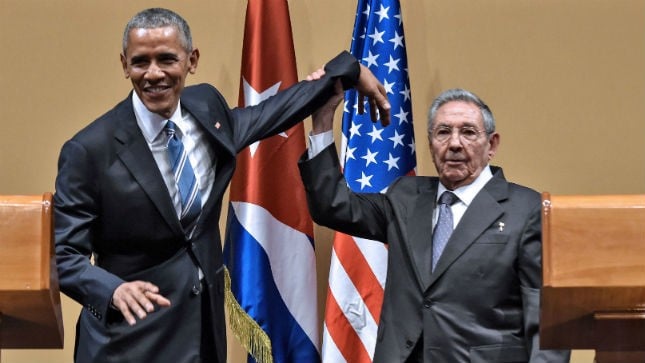 Supporters of President Obama’s policy of unconditional engagement with the Castro dictatorship are in a terrible bind after last week’s VII Cuban Communist Party Congress (“Congress”).
Supporters of President Obama’s policy of unconditional engagement with the Castro dictatorship are in a terrible bind after last week’s VII Cuban Communist Party Congress (“Congress”).
They argue that the prior U.S. policy of principled accountability had given Castro an “excuse” for its recalcitrant and repressive behavior. Removing this “excuse” is the premise of their policy.
So it was interesting to gauge their reaction to the recent Congress.
During the Congress, Gen. Raul Castro retrenched politically, making it clear that he will remain the “supreme leader” of Cuba and its sole party until 2021, hence, not giving up power in 2018, as many naively believed.
Castro also retrenched economically by criminalizing any subjective “accumulation of wealth” by Cuba’s “self-employed” sector (“cuentapropistas”) and refusing to recognize them as legal entities. This, in addition to the previously criminalized “accumulation of property.”
Moreover, the Congress served a healthy dose of anti-American rhetoric, lambasting President Obama and referring to the United States as “the enemy.”
So what was the reaction of Obama’s supporters? That Castro’s retrenchment is due to his feeling “nervous,” “threatened,” and “vulnerable” by the new policy.
In other words, those who argue that the previous policy served as an “excuse” are now arguing that Castro is using Obama as an “excuse.” Better yet — the “excuse” excuse is now their new excuse.
Note how they have dizzied themselves in circles:
Before they argued that Castro’s recalcitrance was due to a “failure” in U.S. policy. Now they argue that Castro’s recalcitrance underscores the “success” of Obama’s policy.
Before they argued that U.S. policy buoyed Castro’s anti-American rhetoric. Now they argue that Castro’s anti-American rhetoric shows Obama has made him “nervous.”
Before they argued that President Bush served as a scapegoat for Castro’s attacks. Now they argue that Castro attacked Obama because he feels “threatened” and “vulnerable.”
But my favorite is U.S. Secretary of State John Kerry. During his tenure in the Senate, Kerry consistently argued that U.S. policy “endangered” dissidents.
Yet, in an recent interview, Kerry now argues that increased repression on the island is a good thing — part of “a positive transformation.”
These inherent contradictions are due to the fact that their premise is wrong.
 If the United States and other democratic nations embrace dictatorial regimes, does anyone truly believe that they’ll democratize and stop repressing their people? Of course not.
If the United States and other democratic nations embrace dictatorial regimes, does anyone truly believe that they’ll democratize and stop repressing their people? Of course not.
Let’s look at some of today’s repressive regimes: What’s the Nicolas Maduro government’s excuse for arresting, torturing and killing Venezuelans? There are no U.S. sanctions on Venezuela and the Obama administration repeatedly sought to accommodate Maduro and his predecessor, Hugo Chavez. What was Iran’s excuse for the 2009 arrest, torture, and killing of courageous democracy activists during the Green Revolution?
The Obama administration remained shamefully silent throughout that tragic crackdown on Iranian dissent. What’s Basar al-Assad’s excuse for the genocide he is waging against the Syrian people? What’s Kim Jong Un’s excuse for his crimes against humanity against the North Korean people?
Dictators use repression to stay in power. They don’t need excuses. When for some reason they feel they must justify their actions, they’ll make up an “excuse,” just as Raul Castro is now doing with Obama. The only people who believe a dictator’s “excuse” are the minions that propagate them.
Knowing that Raul Castro and his cohorts will make up excuses to stay in power, regardless of what the United States and the free-world does, it should be a no-brainer for the American government to oppose its dictatorship and actively support the democracy activists that challenge it.
We can’t recognize or become complicit with Castro’s dictatorship, through tourism, trade and investment deals with its military monopolies, while wishfully awaiting its “good-graces” to reform. That’s not “change” — it’s delusional.
Lifting Sanctions Towards Cuba Would Be a Bad Investment
In order to have an honest debate about trade and tourism sanctions on Cuba, it’s important to understand how that totalitarian regime conducts business.

First, the very concept of trade and investment in Cuba is grounded in a misconception about how “business” takes place on the island. In most of the world, trade and investment means dealing with privately-owned or operated corporations. That’s not the case in Cuba. In Cuba, foreign trade and investment is the exclusive domain of the state, i.e. the Castros. There are no “exceptions.”
Here’s a fact: In the last five decades, every single “foreign trade” transaction with Cuba has been with a state entity. The state’s exclusivity regarding trade and investment was enshrined in Article 18 of Castro’s 1976 Constitution.
The state’s exclusivity even extends to “humanitarian” transactions. Since passage of the 2000 Trade Sanctions Reform and Export Enhancement Act (“TSREEA”), nearly $5 billion in U.S. agricultural and medical products have been sold to Cuba. It is an unpleasant fact, however, that all those sales by more than 250 privately-owned U.S. companies were made to only one Cuban buyer, the Castro regime.
The dominant force in Cuba’s economy is the military’s holding company, called GAESA. Founded by Raul Castro in the 1990s, GAESA controls a wide array of companies, ranging from the very profitable Gaviota S.A., which runs the island’s tourist hotels, restaurants, car rentals and nightclubs, to TRD Caribe S.A., which runs all retail operations. In plain words: GAESA controls virtually every economic transaction in Cuba. It is run by Raul’s son-in-law, General Luis Alberto Rodríguez Lopez- Callejas.
Foreign tourists have made GAESA the largest hotel company in Latin America. It controls more hotel rooms than The Walt Disney Company. Thus, every tourist that stays at Cuba’s Hotel Nacional, has a daiquiri at El Floridita and catches a show at The Tropicana, shares one thing in common — contributing to the Cuban military’s bottom line.
This is the same Cuban military that took possession of a stolen U.S. Hellfire missile for nearly two-years; has been caught twice internationally-smuggling heavy weaponry, including the worst sanctions violations ever to North Korea; that oversees the most egregious abuses of human rights in the Western Hemisphere; that allows Russian military intelligence ships to dock in its ports; that shares intelligence with the world’s most dangerous anti-American regimes; and of which three senior Cuban military officers remain indicted in the United States for the murder of four Floridians.
Not a good investment for America’s interests.
Source: Capitol Hill Cubans
